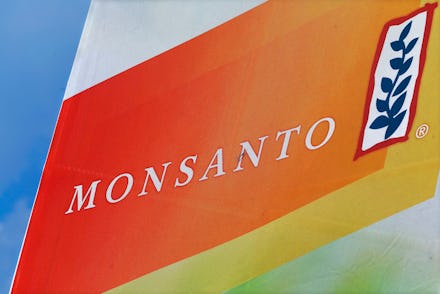Beware rising food prices: Bayer is buying GMO-poster company Monsanto

Food prices could surge, experts say, if a newly-proposed agricultural company acquisition is approved by regulators.
Monsanto — the company that has often been at the center of controversies regarding genetically modified organisms, pesticides, and industrial chemicals — has agreed to be acquired by Bayer, a German agrochemicals firm known best for making drugs like Alka-Seltzer and Aspirin, the companies announced Wednesday.
Monsanto is arguably one of the most dragged companies on the internet, in part because of several big PR disasters during its 100+ year history. For one? It was one of a few companies that produced Agent Orange, a weaponized pesticide that was used in the Vietnam War — with lasting health consequences.
Starting in the mid-1980s, Monsanto began moving more into the manufacturing of seeds. Now, the $66 billion takeover — the largest all-cash deal in history — will make Bayer the largest maker of seeds and agricultural chemicals in the world.
"Bayer's acquisition of 'Frankenstein' crop producer Monsanto could be a horror story for both Bayer and its customers: the farmers," John Colley, a professor at Warwick Business School, told the BBC. "The farmers will lose out as product ranges are rationalized and attempts are made to increase prices."
Professor Radhakrishnan Gopalan, a professor at the Olin School of Business at Washington University in St. Louis, echoed Colley's concerns in a phone interview with Mic.
"[Food] will definitely get more expensive ... I'm guessing all over, because it's not just this merger," Gopalan said. "Any consolidation is not good news for consumers."
In fact, this one is the agriculture industry's second major consolidation this week, after two Canadian companies, Potash Corporation and Agrium, announced they would also be merging.
Dow Chemical and DuPont are also trying to merge, prompting concerns that the whole industry could become less competitive, and make seeds too expensive for farmers: That would affect consumer prices, because farmers would have to compensate for the higher cost of buying seeds.
European regulators have already signaled that they would look into Bayer's Monsanto acquisition for the possibility of anti-trust concerns, although Gopalan said the deal would likely still be approved, since the two companies are not concentrated in exactly the same markets and geographic regions — an important factor regulators look at when determining whether a takeover could be monopolistic.
"Given that Bayer is not very strong in the U.S. ... they have complementary geographic spread," he said.
Then again, Europe, where Bayer is headquartered, certainly is more restrictive than the U.S. when it comes to GMOs.
GMOs get a bad rap — especially because many consumers get angry when modified foods aren't clearly labeled. But whether GMOs are actually all that bad? That's a complicated debate.
Proponents of GMOs might counter that many of the studies linking GMOs to health ailments have been debunked, and they are also an important endeavor in the quest to produce more abundant, better food.
In a statement emailed to Mic, a Monsanto spokeswoman said the merger would "increase returns for farmers" by improving research and allowing for "more effective innovation."
Mic has reached out to Bayer for comment.